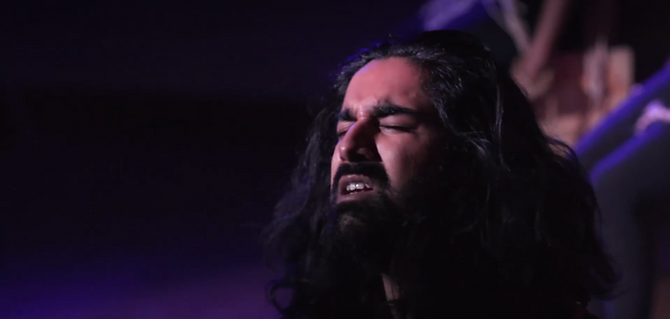MARTINEZ
MARTINEZ
MARTINEZ
MARTINEZ

Imoinda: A Story of Love and Slavery
'The audience at the London premiere was mesmerized'
Anne Manson
Director, Manitoba Chamber Orchestra
Imoinda: A Story of Love and Slavery is an opera that transcends the historical context of slavery, focusing on the powerful themes of love, resilience, and cultural identity. Set in 16th Century Africa, the story follows Prince Oko and Princess Imoinda as they fall in love. Despite Imoinda being promised to another, the lovers' defiance of the King leads to their banishment.
Their journey across the Atlantic is harrowing, yet it is their enduring love and hope that drive them forward. Reunited on a Cuban sugar plantation, their love story reaches a poignant and transformative conclusion, symbolizing the birth of a new Afro-Caribbean culture.
Loosely based on Aphra Behn's 1688 novel Oroonoko: or the Royal Slave, one of the first published works by an English female writer, the libretto is adapted by award-winning poet and academic Joan Anim-Addo. The music is composed by the acclaimed Cuban-American composer Odaline de la Martinez, ensuring a rich and authentic cultural representation.
.png)
'...strong heartfelt stories through multi-layers of rhythm - using the voice as a homing beam for melodic harmony and cries of deep truth from the characters.'
Nadine Benjamin, British Lyric Soprano
Synopsis
Length: 1 h 40 min
Overview
"Imoinda: A Story of Love and Slavery" presents a powerful narrative of love, resilience, and cultural identity, set against the backdrop of historical events.
Act I: Imoinda
In the African kingdom of Guinea, the King hosts a grand ball for a rival tribe's Chief, hoping to cement peace. The Chief, having seen Prince Oko declare his love for Princess Imoinda, chooses her as his wife, creating a dilemma for the King. Oko and Imoinda defy the Chief's choice, leading to their banishment to the Americas.
Act II: The Crossing
This act depicts the perilous Middle Passage, the Atlantic journey endured by the enslaved. Though Oko and Imoinda are on the same ship, they remain unaware of each other’s presence, enduring the journey with hope and strength.
Act III: Plantation
In Cuba, Oko and Imoinda reunite under harsh conditions. Imoinda, now a house slave, is pregnant with her master’s child. Initially rejecting the baby, she soon sees it as a symbol of new life and the beginning of Afro-Cuban culture.
'Ambitious
venture'
Opera Magazine

The Specs & Arrangement
Vocal Forces:
● Princess Imoinda: Lyric Soprano
● Prince Oko: Lyric Tenor
● The King: Tenor
● The Chief: Baritone
● Imoinda’s Maid and Santera: Mezzo Soprano
● Baku, Oko’s Servant: Spoken Role
● Vocal Ensemble: 8-12 singers (Sopranos, Altos, Tenors, Basses)
● Choir in The Crossing: Can be the vocal ensemble or a larger choir
Minimal Instrumental Forces:
● Strings: 1st Violin, 2nd Violin, Viola, Cello, Double Bass
● Keyboard: Electric Piano with Volume Pedal
● Percussion (4 players):
○ Perc. 1: Claves, Cuban Cencerro (Agogo), 2 Tam Tams (medium & low)
○ Perc. 2: Conga (medium), Timbales (2 sets, high to low)
○ Perc. 3: Bongos (2 sets, different sizes), Tom Tom, Samba Whistle
○ Perc. 4: Bass Drum (lying flat), Tom Tom (shared with Perc. 3, higher in pitch than B.D.), Bongos (2 sets, shared with Perc. 3, higher in pitch than Tom Tom)
'...strong heartfelt stories through multi-layers of rhythm - using the voice as a homing beam for melodic harmony and cries of deep truth from the characters.'
Nadine Benjamin, British Lyric Soprano
The Creators


Born in Cuba and raised in the USA, Odaline de la Martinez is a formidable force in today's classical music scene, now based in the UK. She is an award-winning composer, conductor, record producer, and event curator. Notably, she was the first woman to conduct a BBC Prom at the Royal Albert Hall at age 34. Martínez' compositions have been showcased across some of the world's most prestigious classical music venues, including Carnegie Hall, Wigmore Hall, Southbank Centre, St John's Smith Square and the Royal College of Music, amongst many others.
Her extensive experience in both classical and contemporary music shines in Imoinda as it is musically rich, innovative, and deeply respectful of its cultural musical roots. Her compositions weave together the pain, hope, and resilience of its characters, creating an unforgettable auditory experience that will deeply move and resonate with audiences.



Joan Anim-Addo is a Professor of Caribbean Literature and Culture at Goldsmiths, University of London, and the Director of the Centre for Caribbean and Diaspora Studies. Her role as Director underscores her commitment to authentic cultural representation. She has published extensively, including the libretto for Imoinda, the poetry collections Haunted by History and Janie Cricketing Lady, and the literary history Touching the Body: History, Language and African-Caribbean Women’s Writing. In 2016, she received a Lifetime Achievement Award from Callaloo for her invaluable contributions to literature and cultural studies.
.png)
Themes/Experiences
● Enduring Love: Strength and resilience of love in adversity.
● Cultural Identity and Heritage: Celebrating Afro-Caribbean and Afro-Cuban cultures.
● Historical Reflection: Humanized portrayal of slavery's history.
● Empowerment and Resistance: Emphasizing resilience and agency.
● Cultural Fusion: Blending diverse music and dance traditions.
● Modern Relevance: Connecting history to contemporary issues.
Unique Propositions
● Fusion of Afro-Caribbean Music and Western European Opera: Blending diverse musical traditions to create a unique and enriching auditory experience.
● Fusion of Afro-Caribbean Dance and Classical Ballet: Integrating powerful dance forms to convey the emotional depth and cultural significance of the narrative.
● A Rare Opera About Slavery: Offering a nuanced and humanized portrayal of historical events, focusing on resilience and empowerment.
● Based on "Oroonoko" by Aphra Behn: Drawing from one of the first published works by an English female writer, adding literary depth and historical significance.
● First Opera About the Birth of Afro-Caribbean Culture: Celebrating the origins and contributions of Afro-Caribbean heritage, providing a new perspective in the operatic world.
Watch Selected Scenes